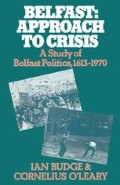Abstract
SIGNS of the impending crisis in Northern Ireland are scattered through the evidence reviewed in previous chapters. When interpreted contextually, these give strong indications of how and why a crisis developed. The class division underlying politics in Britain was in Belfast overlaid by religious tension and Unionist hegemony (Chapter 8). That hegemony was seen as irreversible under existing procedures because it was based on the solid support of a popular majority — the Protestants (Chapter 7). Party divisions carried over (although not as clear-cut cleavages) into political attitudes and preferences on issues (Chapter 9). Unionist councillors formed a socioeconomic elite who ran the Corporation as their personal machine, where non-Unionist representatives seemed not to belong (Chapters 4, 5, 10). Certainly a majority of Unionist adherents and councillors — seconded by the press — wished in 1966 to make conciliatory moves towards the Catholics (Chapters 9 and 11), which if carried through might have defused the imminent crisis.
Access this chapter
Tax calculation will be finalised at checkout
Purchases are for personal use only
Preview
Unable to display preview. Download preview PDF.
Notes
For assessment of the procedural indicators see Ian Budge et al., Political Stratification. Chapter 2. For some discussion of the contrasts in procedural support between Glasgow and Belfast see Ian Budge, ‘Support for Nation and Government among English Children: An Alternative Interpretation’, British Journal of Political Science, Vol. 1 (1971), pp. 288–392. On cross-cutting in Glasgow and Belfast see Ian Budge and Cornelius O’Leary, ‘Cross-cutting Cleavages, Agreement and Compromise: An Assessment of Three Leading Hypotheses Against Scottish and Northern Irish Survey Responses’, Midwest Journal of Political Science, Vol. XV (January 1971), pp. 1–30; Ian Budge and Cornelius O’Leary, ‘Relationships Between Attitudinal and Background Crosscutting: theoretical modifications suggested by further evidence from Glasgow and Belfast’, Midwest Journal of Political Science, Vol. XVI (Summer 1972), forthcoming.
This characterisation of cross-cutting is employed by D. Rae and M. J. Taylor in The Analysis of Political Cleavages (New Haven, 1970), p. 92.
Author information
Authors and Affiliations
Copyright information
© 1973 Ian Budge and Cornelius O’Leary
About this chapter
Cite this chapter
Budge, I., O’Leary, C. (1973). Support for Established Institutions, Cross-cutting and the Reaction of Political Moderates. In: Belfast: Approach to Crisis. Palgrave Macmillan, London. https://doi.org/10.1007/978-1-349-00126-2_13
Download citation
DOI: https://doi.org/10.1007/978-1-349-00126-2_13
Publisher Name: Palgrave Macmillan, London
Print ISBN: 978-1-349-00128-6
Online ISBN: 978-1-349-00126-2
eBook Packages: Palgrave Literature & Performing Arts CollectionLiterature, Cultural and Media Studies (R0)

